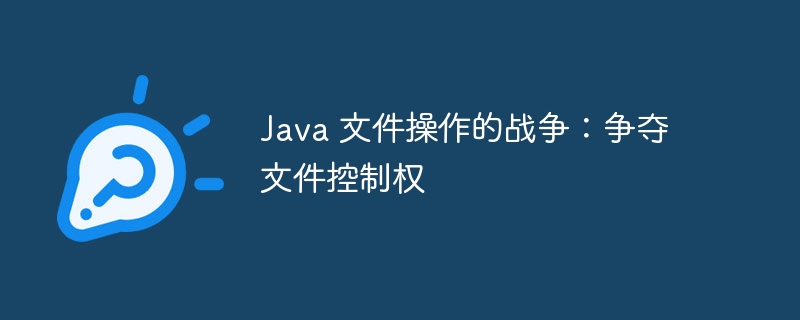Home >Java >javaTutorial >The Java File Operation Wars: Fighting for File Control
The Java File Operation Wars: Fighting for File Control
- PHPzforward
- 2024-03-21 11:21:16527browse

php editor Xinyi will take you to explore the world of Java file operations in depth, and discuss the importance of file control and the skills to fight for it. In the field of programming, file operations are an essential part. How to effectively manage and control files is crucial to the operation of the program and data security. This article will reveal to you the mysteries of Java file operations and help you better deal with the challenges of file control.
-
advantage:
- Easy to use, with extensive out-of-the-box utility and library support
- Provides byte-by-byte processing to facilitate fine-grained operations
-
shortcoming:
- I/O operations are less efficient, especially for large files
- Lack of direct access to file metadata (such as timestamps)
- Can be tedious when dealing with binary data
Channel-based API
-
advantage:
- High performance, suitable for processing large files
- Provides direct access and control of file metadata
- Allow efficient non-blocking I/O operations
-
shortcoming:
- It is more complicated to use than stream api and requires more in-depth Java knowledge
- May be overkill for small files or situations requiring fine-grained processing
Performance comparison
For large file operations, channel-based APIs are significantly better than stream-based APIs. Direct memory access and non-blocking I/O capabilities significantly improve performance. For small files, a stream-based API may be faster due to its lower overhead.
Metadata Access
The channel-based API provides direct access to file metadata such as creation date, modification date, and permissions. In contrast, stream-based APIs require additional steps and the use of system calls to obtain this information.
Suitable for specific scenarios
For most use cases, stream-based APIs are a simple and flexible choice. It is easy to learn and use, and is suitable for a variety of file operation tasks. On the other hand, for high-volume file operations where performance is critical, a channel-based API is a better choice. It provides advanced control and optimization of I/O operations.
Best Practices
When choosing a file manipulation API, you should consider the following best practices:
- For small files (
- For large files (>10MB), use the channel-based API.
- If you need fine-grained control over file metadata, use the channel-based API.
- For tasks requiring high-performance non-blocking I/O, use the channel-based API.
In the end, the "war" for file control was fruitless. Both methods excel in their respective fields, and the choice depends on the specific needs of the application. By understanding the advantages and disadvantages of each API, developers can make informed decisions to achieve success in Java file operations.
The above is the detailed content of The Java File Operation Wars: Fighting for File Control. For more information, please follow other related articles on the PHP Chinese website!

